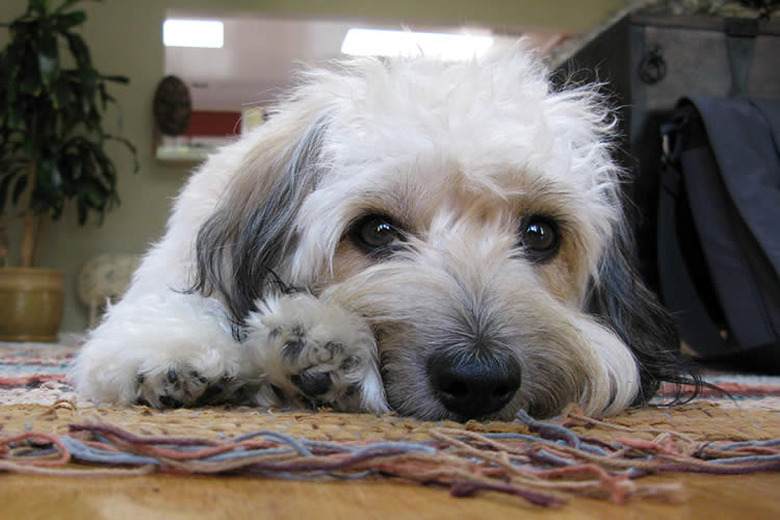Why Would A Dog Fear A Certain Room?
No matter how many times you try to convince your pup that his fear of a certain room is unfounded, he probably just looks at you and thinks you have no idea of the terror that awaits him there. See what may be the source of his fear so you can help him overcome it.
Your dog may have had a negative experience in a particular room.
Your dog may have had a negative experience in a particular room.
Some pups will go to great lengths to avoid everything he associates with a negative experience. If something bad happened to him in a particular room, he may shun that room for a long time. Let's say you have a small corner room in your apartment and your pup used to sleep behind your computer chair. If you rolled back in your chair and caught his foot, he may decide it's just not worth the risk to go into that room anymore. If you shook a can of coins and startled him when he tried to go into the laundry room as a youngster, he may avoid that area. Think back in time and try to remember whether there was a specific event or a chain of events that could have left a negative impression on your little guy.
Some dogs react poorly to noise-prone rooms.
Some dogs react poorly to noise-prone rooms.
Some canines could snooze all day with their head slumped against the washing machine. Others may hear the machine kick on and then run for their lives. Anything emitting unexpected sounds (especially loud ones) can trigger a fear response in your pup, or at least make him cautious. Those who aren't too afraid sometimes approach the noise and learn that it's nothing to be afraid of, but yours may have a more cautious personality and stay out of the area entirely.
Rooms can contain objects that frighten dogs.
Rooms can contain objects that frighten dogs.
Sometimes even the most benign household objects may, for some reason, be a source of terror for your dog. Dogs have been known to be afraid of such diverse items as fireplaces, refrigerators, and bathtubs. After all, an active fireplace with its popping sounds and orange flames can freak your pup out, a tall and imposing fridge can give off an ominous hum and rattle on occasion, and the bathtub is where those awful baths happen. Your pup may only avoid the room where the object is located if it's in use or he may just avoid it altogether. Some dogs also fear new things. If you brought home a new TV or couch, he may look at the object with caution, creep into the room or outright avoid it for a bit.
You may be misreading the meaning behind your dog's actions.
You may be misreading the meaning behind your dog's actions.
It's natural to think your pup is afraid of a room when he avoids it, but it's not always fear that keeps him out. He may not like the room, and that's all there is to it. If you have a German shepherd and a small apartment bathroom, for example, he might stay out because he feels too cramped inside. If you have an unheated sunroom, your pup may keep out of it in winter because it's too cold. Call him into the room you believe he's afraid of. If he is fearful of the area, he might slink in with his head down and tail tucked, or he might bolt for an exit soon after entering. If he's not afraid, he'll likely join you without a problem. Note that this test is not foolproof. Some dogs feel much more comfortable and safe around their owners and do not display the same types of fear responses they do when they're alone.
How to help your dog feel comfortable in a scary room.
How to help your dog feel comfortable in a scary room.
If your dog truly is afraid of a particular room in your house, begin to associate the room with something positive, like his favorite toy, his food or treats. If your pup is frightened by the new TV, persuade him over with a scrumptious treat. As soon as he walks into the room, throw him the treat, give him praise and make him come closer and closer each time. If he's afraid of a room because, at one time, he was yelled at to get out of there, show him the room is perfectly safe by feeding him and playing with him near it and then eventually crossing into the territory of the room.
Important: Never coddle your dog when he's afraid as that only reinforces the behavior. Rather, offer praise for his bravery whenever he gets near/inside the room.
